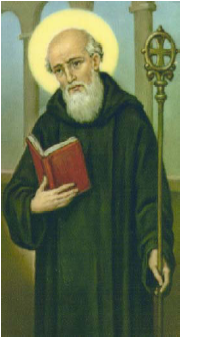St Benedict (c.480–543), born in Italy after the fall of the Roman Empire, founded a number of monasteries and is credited with being the founder of Christian monasticism in Catholic western Europe. Here he writes in The Holy Rule of St Benedict of the relationships between the abbot or superior and the monks within the monastery, explaining mimetic pedagogy, consistent with the didactic teaching of a committed knowledge system.

To thee, therefore, my speech is now directed, who, giving up thine own will, takest up the strong and most excellent arms of obedience, to do battle for Christ the Lord, the true King …
The Abbot who is worthy to be over a monastery, ought always to be mindful of what he is called, and make his works square with his name of Superior. For he is believed to hold the place of Christ in the monastery, when he is called by his name, according to the saying of the Apostle: ‘You have received the spirit of adoption of sons, whereby we cry Abba (Father)’ (Rom 8:15). Therefore, the Abbot should never teach, prescribe, or command (which God forbid) anything contrary to the laws of the Lord; but his commands and teaching should be instilled like a leaven of divine justice into the minds of his disciples …
For in his teaching the Abbot should always observe that principle of the Apostle in which he saith: ‘Reprove, entreat, rebuke’ (2 Tm 4:2), that is, mingling gentleness with severity, as the occasion may call for, let him show the severity of the master and the loving affection of a father. He must sternly rebuke the undisciplined and restless; but he must exhort the obedient, meek, and patient to advance in virtue. But we charge him to rebuke and punish the negligent and haughty …
Let no one in the monastery follow the bent of his own heart, and let no one dare to dispute insolently with his Abbot, either inside or outside the monastery. If any one dare to do so, let him be placed under the correction of the Rule. Let the Abbot himself, however, do everything in the fear of the Lord and out of reverence for the Rule, knowing that, beyond a doubt, he will have to give an account to God, the most just Judge, for all his rulings …
[It] belongeth to the master to speak and to teach; it becometh the disciple to be silent and to listen. If, therefore, anything must be asked of the Superior, let it be asked with all humility and respectful submission. But coarse jests, and idle words or speech provoking laughter, we condemn everywhere to eternal exclusion; and for such speech we do not permit the disciple to open his lips …
[F]or the love of God a man subject himself to a Superior in all obedience, imitating the Lord, of whom the Apostle saith: ‘He became obedient unto death’ (Phil 2:8) … [A] monk withholdeth his tongue from speaking, and keeping silence doth not speak until he is asked; for the Scripture showeth that ‘in a multitude of words there shall not want sin’ (Prov 10:19).
St Benedict. c.530 (1949). The Holy Rule of St. Benedict. Prologue, II, III, VI, VII. || WorldCat
